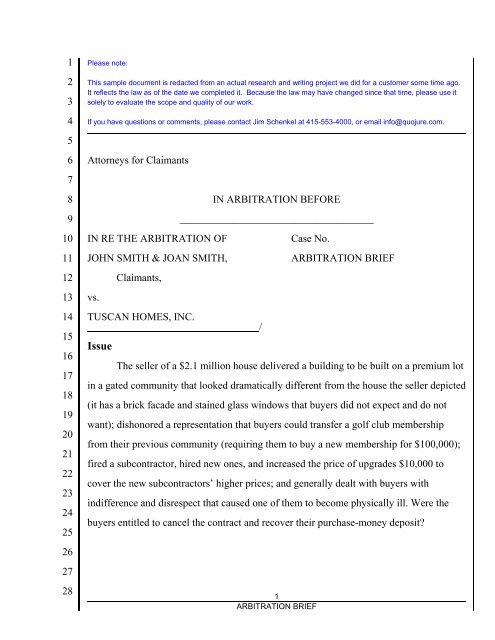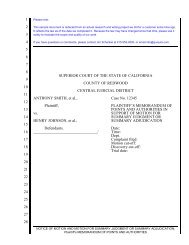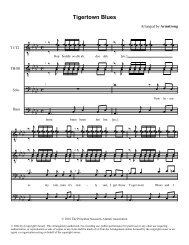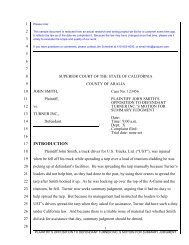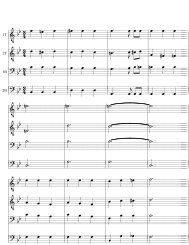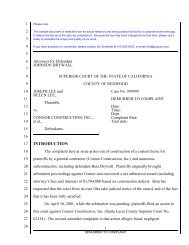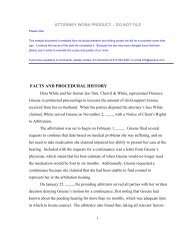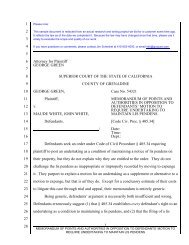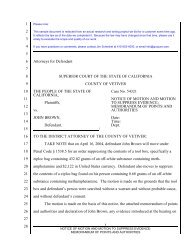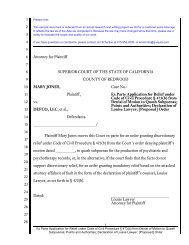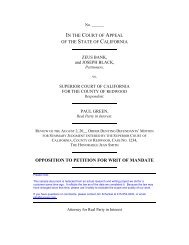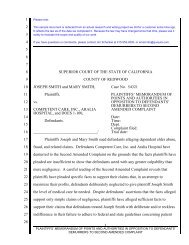Arbitration brief - Quo Jure Corporation
Arbitration brief - Quo Jure Corporation
Arbitration brief - Quo Jure Corporation
Create successful ePaper yourself
Turn your PDF publications into a flip-book with our unique Google optimized e-Paper software.
1<br />
2<br />
3<br />
4<br />
5<br />
6<br />
7<br />
8<br />
9<br />
10<br />
11<br />
12<br />
13<br />
14<br />
15<br />
16<br />
17<br />
18<br />
19<br />
20<br />
21<br />
22<br />
23<br />
24<br />
25<br />
26<br />
27<br />
28<br />
Please note:<br />
This sample document is redacted from an actual research and writing project we did for a customer some time ago.<br />
It reflects the law as of the date we completed it. Because the law may have changed since that time, please use it<br />
solely to evaluate the scope and quality of our work.<br />
If you have questions or comments, please contact Jim Schenkel at 415-553-4000, or email info@quojure.com.<br />
Attorneys for Claimants<br />
IN RE THE ARBITRATION OF<br />
JOHN SMITH & JOAN SMITH,<br />
vs.<br />
Claimants,<br />
TUSCAN HOMES, INC.<br />
Issue<br />
IN ARBITRATION BEFORE<br />
_____________________________________<br />
/<br />
Case No.<br />
1<br />
ARBITRATION BRIEF<br />
ARBITRATION BRIEF<br />
The seller of a $2.1 million house delivered a building to be built on a premium lot<br />
in a gated community that looked dramatically different from the house the seller depicted<br />
(it has a brick facade and stained glass windows that buyers did not expect and do not<br />
want); dishonored a representation that buyers could transfer a golf club membership<br />
from their previous community (requiring them to buy a new membership for $100,000);<br />
fired a subcontractor, hired new ones, and increased the price of upgrades $10,000 to<br />
cover the new subcontractors’ higher prices; and generally dealt with buyers with<br />
indifference and disrespect that caused one of them to become physically ill. Were the<br />
buyers entitled to cancel the contract and recover their purchase-money deposit?
1<br />
2<br />
3<br />
4<br />
5<br />
6<br />
7<br />
8<br />
9<br />
10<br />
11<br />
12<br />
13<br />
14<br />
15<br />
16<br />
17<br />
18<br />
19<br />
20<br />
21<br />
22<br />
23<br />
24<br />
25<br />
26<br />
27<br />
28<br />
FACTS<br />
In June 2___, John and Joan Smith (collectively “Smith”) agreed to buy a house to<br />
be built on a premium lot overlooking the 18 th green in a golf club development called<br />
“Sienna Hills” in Tuscan, California. The seller was Tuscan Homes. The purchase price,<br />
including upgrades, was $2,100,000. Smith deposited a total of $100,000, with the<br />
balance due at closing.<br />
In May 2___, Smith opted to cancel the purchase for reasons described below.<br />
Tuscan Homes claims the deposits under a liquidated-damages clause. Buyers claim the<br />
deposits based on the following facts:<br />
(i)<br />
(ii)<br />
(iii)<br />
(iv)<br />
Tuscan Homes drastically changed the home’s exterior finish from the<br />
finish depicted in the drawing Buyers saw. The changes included a brick<br />
facade and stained glass windows, both of which Buyers disliked.<br />
Tuscan Homes fired subcontractors for flooring and cabinet upgrades and<br />
required Buyers to reorder from new subcontractors at higher prices.<br />
Tuscan Homes told Buyers they could transfer their golf club membership<br />
from the community where they lived to the Sienna Hills golf club, then<br />
told them they would have to buy a new membership for $100,000.<br />
Tuscan Homes also failed Buyers in other ways, such as:<br />
• firing the general manager (Buyers’ neighbor, in whom they had<br />
confidence that helped motivate the purchase);<br />
• cutting out night hours for the health club, making the development less<br />
attractive to many buyers of working age;<br />
• firing the project manager and hiring a new one without any notice to<br />
Buyers;<br />
• failing to enforce landscaping rules on numerous investor-owned,<br />
unoccupied properties;<br />
• ignoring security issues after months of notice; and<br />
2<br />
ARBITRATION BRIEF
1<br />
2<br />
3<br />
4<br />
5<br />
6<br />
7<br />
8<br />
9<br />
10<br />
11<br />
12<br />
13<br />
14<br />
15<br />
16<br />
17<br />
18<br />
19<br />
20<br />
21<br />
22<br />
23<br />
24<br />
25<br />
26<br />
27<br />
28<br />
• generally providing poor customer service from the inception of the<br />
transaction.<br />
This course of events so exasperated Buyers that by March 2___, Joan Smith had<br />
developed persistent digestive problems and depression.<br />
Chronology<br />
May 28 {prior year}: The Smiths buy the property based in part on<br />
representations by the sales agent, Linda Jones, that the exterior finish would be as<br />
depicted (they are shown a picture of the model); and that they can transfer their golf club<br />
membership from their present community to Sienna Hills without charge.<br />
June: Buyers arrange to meet Tuscan Homes representatives on June 5, a business<br />
day, to see the lot as staked, to be sure the house will directly face the 18th. The lot is not<br />
staked as promised, so the meeting (for which Buyers had to cancel appointments) is a<br />
waste of time. Later, when it is staked, it does not face the 18 th green. Tuscan Homes<br />
resists shifting the siting slightly to correct the problem (but later gives way).<br />
Buyers select interior upgrades with Tuscan Homes’s Design Center Manager, and<br />
are told that they can make electrical system changes during the “electrical walkthrough.”<br />
Buyers contact Homewerk, Tuscan Homes’ subcontractor, to select other finishes:<br />
flooring, carpeting, and countertops. They are told that the earliest available appointment<br />
is with “Joyce” on August 3; their request to work with a different representative is<br />
refused.<br />
July 5: Buyers learn that the General Manager, Mike Murphy, whom they knew<br />
and trusted to keep Sienna Hills as it should be kept, had been fired before they went to<br />
contract. The new General Manager, Leo Butler, immediately cuts amenities. Among<br />
other things, Butler eliminates evening hours for the health club, even though Sienna<br />
Hills is marketed as a “young” community, which means that many members, including<br />
3<br />
ARBITRATION BRIEF
1<br />
2<br />
3<br />
4<br />
5<br />
6<br />
7<br />
8<br />
9<br />
10<br />
11<br />
12<br />
13<br />
14<br />
15<br />
16<br />
17<br />
18<br />
19<br />
20<br />
21<br />
22<br />
23<br />
24<br />
25<br />
26<br />
27<br />
28<br />
Buyers, can’t use the club at all except on weekends. Butler dismisses Joan’s complaint,<br />
suggesting that she buy her own gym equipment and exercise at home.<br />
August: Appointment with Joyce is rescheduled for August 31 (the earliest Joyce<br />
will offer), which is beyond Tuscan Homes’s deadline. Tuscan Homes approves the<br />
change. Buyers make their selections.<br />
September: Buyers learn, in passing, that Tuscan Homes is changing subcontractors.<br />
Tuscan Homes gives them the new subs’ names on a post-it note and tells<br />
them to call the subs in a month or so.<br />
October: Buyers wait a month, then contact new subs to make appointments. The<br />
new subs know nothing about Buyers and won’t make appointments because Tuscan<br />
Homes hasn’t sent the subs their files.<br />
January 6: Tuscan Homes’ new subs finally meet with Buyers. Buyers re-select<br />
the same upgrades they had previously made with Homewerk, only to find that the costs<br />
are now $10,000 higher than before. Tuscan Homes refuses to cover this increase.<br />
Buyers are informed that their house will have a brick facade and stained glass<br />
windows—neither of which were in the drawing they were shown and both of which they<br />
dislike.<br />
Sienna Hills homeowners meet to discuss security problems and make<br />
recommendations to the Homeowners’ Association (which Tuscan Homes still controls).<br />
Tuscan Homes informs Buyers that construction is behind schedule and closing<br />
will not occur by the end of April, as promised.<br />
Buyers discover that they cannot transfer their golf club membership as promised.<br />
They will have to buy a new $100,000 membership and sell the old one or carry both.<br />
Buyers learn by word of mouth that Joe Nguyen, the Project Manager, has<br />
resigned and been replaced by “Alex.” Tuscan Homes provides no notice of this change.<br />
“Alex” never calls, writes, or otherwise contacts Buyers to introduce himself.<br />
Joan, in distress over Tuscan Homes’s repeated delays, mishandling, and ill<br />
4<br />
ARBITRATION BRIEF
1<br />
2<br />
3<br />
4<br />
5<br />
6<br />
7<br />
8<br />
9<br />
10<br />
11<br />
12<br />
13<br />
14<br />
15<br />
16<br />
17<br />
18<br />
19<br />
20<br />
21<br />
22<br />
23<br />
24<br />
25<br />
26<br />
27<br />
28<br />
treatment, begins to feel unwell, with digestive problems that do not respond to treatment,<br />
and depression.<br />
May: Problems with Sienna Hills persist or grow worse.<br />
Security issues, including Sienna Hills’s gate lighting, which homeowners have<br />
been complaining about since February, remain unresolved.<br />
The Main Entrance hasn’t had landscape lights or fountain lights since January,<br />
despite numerous calls to management and the HOA.<br />
Many homes bought by investors remain unoccupied and unlandscaped, in<br />
violation of Sienna Hills’s by-laws, creating unsightly conditions and depressing property<br />
values.<br />
On May 18, Buyers give notice, through counsel, that they are cancelling their<br />
purchase and want their deposits back.<br />
On May 26, Tuscan Homes, through Project Manager Alex Nelsand, declares<br />
Buyers in material breach.<br />
DISCUSSION<br />
1. Tuscan Homes breached the contract by delivering a house substantially<br />
different from the house Buyers agreed to buy, entitling claimants to<br />
cancel the purchase and recover their deposits.<br />
The model and elevation of the house the claimants agreed to buy was the model<br />
as depicted by Tuscan Homes’ sales agent, Linda Jones. On the day of the sale, Jones<br />
told Buyers that no example of that model was available to view, but that they had no<br />
need to see a model because the model’s appearance was the same as was shown in the<br />
drawing.<br />
Buyers agreed to buy the house based on Jones’s depiction. They were entitled to<br />
rely on that depiction because Jones was the sales agent for Sienna Hills and purported to<br />
know the appearance of the model she described.<br />
5<br />
ARBITRATION BRIEF
1<br />
2<br />
3<br />
4<br />
5<br />
6<br />
7<br />
8<br />
9<br />
10<br />
11<br />
12<br />
13<br />
14<br />
15<br />
16<br />
17<br />
18<br />
19<br />
20<br />
21<br />
22<br />
23<br />
24<br />
25<br />
26<br />
27<br />
28<br />
The house as built may have been substantially similar to the model house Tuscan<br />
Homes intended, but it was not the same as or substantially similar to the picture. The<br />
pictured model had a stucco facade and clear windows, but the house as constructed had a<br />
brick facade and stained glass windows. These features completely altered the<br />
appearance of the house, changing it from the style the Buyers chose to one they found<br />
unacceptable.<br />
In sum, the parties did not have in mind the same design for the house. There may<br />
have been a mutual mistake on the part of claimants and Jones, or a negligent<br />
misrepresentation by Jones, which she never corrected. In either case, claimants are<br />
entitled to rescission and restitution.<br />
2. A mutual mistake prevents contract formation.<br />
A mistake of fact can prevent contract formation if the fact (past or present) is<br />
material and the mistake is not caused by the mistaken party’s neglect of a legal duty.<br />
Civ. Code § 1577. When there is a mutual misunderstanding regarding the identity of the<br />
contract’s subject matter and both parties or neither is at fault in creating the mistake,<br />
there is no meeting of the minds as to a material matter and no contract is formed. Id.,<br />
§ 1580. See 1 Miller & Starr, CALIFORNIA REAL ESTATE (3d ed., 2000), §§ 115-116 at<br />
398-399.<br />
For example, in Chakmak v. H. J. Lucas Masonry, Inc. (1976) 55 Cal.App.3d 124,<br />
a trade journal erroneously advertised that a contractor was preparing to bid on a state<br />
project in Hayward when in fact he intended to bid on a different project (for the same<br />
state agency) in Fresno. A subcontractor submitted a bid for the Hayward project and the<br />
contractor accepted it, thinking it was for the Fresno project, but neither party specifically<br />
identified it. When the contractor sued to enforce the subcontractor’s bid, the court held<br />
that it could not do so unless the subcontractor had bid negligently. Id. at 129; 1 Miller &<br />
Starr, supra, § 116 at 399-400 and n.3, citing Raffles v. Wichelhaus (1864), 2 H. &.C. 906<br />
6<br />
ARBITRATION BRIEF
1<br />
2<br />
3<br />
4<br />
5<br />
6<br />
7<br />
8<br />
9<br />
10<br />
11<br />
12<br />
13<br />
14<br />
15<br />
16<br />
17<br />
18<br />
19<br />
20<br />
21<br />
22<br />
23<br />
24<br />
25<br />
26<br />
27<br />
28<br />
(the “Peerless” case, in which the parties contracted for a sale of cotton “ex Peerless,<br />
arriving from Bombay” but two ships named “Peerless” were arriving from Bombay, one<br />
in October and one in December, and the buyer and seller meant different ships).<br />
This case is factually different from Chakmak or Raffles but legally similar. If<br />
Jones had in mind a different model or elevation than the one the contract specified and<br />
described it to claimants incorrectly, then the parties were mutually mistaken as to a<br />
material fact: the appearance of the house.<br />
3. A negligent misrepresentation as to a material fact allows a misled party<br />
to avoid a contract.<br />
Alternatively, Jones’s description of the house may be a negligent<br />
misrepresentation. The elements of negligent misrepresentation are:<br />
(i)<br />
(ii)<br />
(iii)<br />
(iv)<br />
(v)<br />
A representation of a material fact. Here, Jones specifically described the<br />
elevation of the model she was offering to sell to claimants in lieu of<br />
showing them a model of it.<br />
Falsity and lack of reasonable grounds to believe the representation is true.<br />
Here, the description departed materially from the house as built.<br />
Intent to induce reliance. Here, Jones invited claimants to rely on her<br />
description and buy the property without viewing an exemplar.<br />
Justifiable reliance on the false statement. Here, claimants had no reason to<br />
doubt that Jones’s description was accurate.<br />
Resulting harm: a dwelling displeasing to claimants in its overall<br />
appearance.<br />
See 1 Miller & Starr, supra, § 126 at 442-443.<br />
7<br />
ARBITRATION BRIEF
1<br />
2<br />
3<br />
4<br />
5<br />
6<br />
7<br />
8<br />
9<br />
10<br />
11<br />
12<br />
13<br />
14<br />
15<br />
16<br />
17<br />
18<br />
19<br />
20<br />
21<br />
22<br />
23<br />
24<br />
25<br />
26<br />
27<br />
28<br />
4. Rescission is a proper remedy for mutual mistake or material<br />
misrepresentation of fact.<br />
Consent is not real when it is based on a mutual mistake of fact, and it is not given<br />
freely when it is obtained by fraud, deceit, or other wrongful means. 1 Miller & Starr,<br />
supra, § 115 at 397. Thus a party induced to buy property by a mutual mistake or a<br />
material misrepresentation of fact, whether intentional or negligent, is entitled to rescind<br />
the transaction. Civ. Code § 1566.<br />
5. Tuscan Homes breached the contract in many other ways.<br />
(i)<br />
(ii)<br />
(iii)<br />
Golf club membership. Jones told claimants that they could transfer their<br />
golf club membership without any additional fee, and claimants justifiably<br />
relied on this representation. Later, Tuscan Homes informed claimants that<br />
they would have to buy a new membership for $100,000.<br />
Flooring, carpeting, and counter-tops price increase. Tuscan Homes<br />
changed subcontractors in mid-stream; the new subcontractors demanded<br />
$10,000 more for the same upgrades.<br />
Unacceptable customer service. An implied term of every consumer<br />
contract, similar to the implied covenant of good faith and fair dealing in<br />
every contract, is a covenant to provide reasonably satisfactory service<br />
during performance. The scope of this duty depends on the contract’s<br />
subject matter and surrounding circumstances.<br />
Here, the contract’s subject matter was construction of a $1.5 million house for<br />
claimants on a premier lot in a luxury gated community. These circumstances call for a<br />
higher level of service than claimants received. Indeed, Tuscan Homes impliedly or<br />
expressly promised a high level of service when, in a letter dated July 10, 2___, the<br />
company declared: “Our goal is to make your home building experience a pleasure.<br />
During this especially exciting time, your Project Manager and Sales Manager are here to<br />
8<br />
ARBITRATION BRIEF
1<br />
2<br />
3<br />
4<br />
5<br />
6<br />
7<br />
8<br />
9<br />
10<br />
11<br />
12<br />
13<br />
14<br />
15<br />
16<br />
17<br />
18<br />
19<br />
20<br />
21<br />
22<br />
23<br />
24<br />
25<br />
26<br />
27<br />
28<br />
guide you every step of the way.”<br />
Instead, as described above, Tuscan Homes and its subcontractors:<br />
(i)<br />
(ii)<br />
changed General Managers without prior notice before the sale, even<br />
though they knew or should have known that the man they dismissed,<br />
whom claimants knew as a neighbor and held in high regard, was a<br />
significant factor in claimants’ decision to buy at Sienna Hills;<br />
delayed and rescheduled claimants’ appointments, sometimes on very short<br />
notice;<br />
(iii) resisted reasonable requests for changes claimants were entitled to request;<br />
(iv)<br />
(v)<br />
(vi)<br />
(vii)<br />
(viii)<br />
chided claimants for missing deadlines Tuscan Homes had waived;<br />
changed Project Managers in mid-construction without prior notice to<br />
claimants and without any subsequent introduction;<br />
cut amenities, particularly by eliminating evening hours at the health club;<br />
failed to resolve maintenance and security issues after months of requests;<br />
and<br />
failed to enforce landscaping requirements, leaving many lots unsightly.<br />
Such acts and omissions were not at all what Tuscan Homes had led claimants to<br />
expect. Cumulatively, this course of conduct led claimants to conclude that they wanted<br />
no further dealings with Tuscan Homes. Tuscan Homes, in good faith, should allow<br />
claimants to cancel the purchase without forfeiting their $71,000 deposits.<br />
6. Even if Tuscan Homes is not in breach, it is not entitled to liquidated<br />
and sale:<br />
damages.<br />
The Civil Code limits the amount of liquidated damages in a real estate purchase<br />
If the amount actually paid pursuant to the liquidated damages provision<br />
exceeds three percent of the purchase price, the provision is invalid unless the<br />
9<br />
ARBITRATION BRIEF
1<br />
2<br />
3<br />
4<br />
5<br />
6<br />
7<br />
8<br />
9<br />
10<br />
11<br />
12<br />
13<br />
14<br />
15<br />
16<br />
17<br />
18<br />
19<br />
20<br />
21<br />
22<br />
23<br />
24<br />
25<br />
26<br />
27<br />
28<br />
party seeking to uphold the provision establishes that the amount actually<br />
paid is reasonable as liquidated damages.<br />
Civ. Code § 1675(d).<br />
The Contract itself contains a similar provision ( 7.2.4.3).<br />
The amount claimants deposited, $100,000, is 4.78% of the $2,100,000 purchase<br />
price. Therefore, Tuscan Homes is not entitled to liquidated damages unless it proves that<br />
the deposit is reasonable as liquidated damages.<br />
When claimants cancelled the purchase, the market for comparable properties was<br />
still rising. Thus the cancellation did not damage Tuscan Homes.<br />
CONCLUSION<br />
Tuscan Homes’ conduct entitles claimants to rescind the purchase contract, and to<br />
demand that Tuscan Homes return the deposit claimants paid.<br />
Dated: December ___, 2___<br />
1<br />
ARBITRATION BRIEF<br />
Respectfully submitted,<br />
Attorney for Claimants<br />
John and Joan Smith


